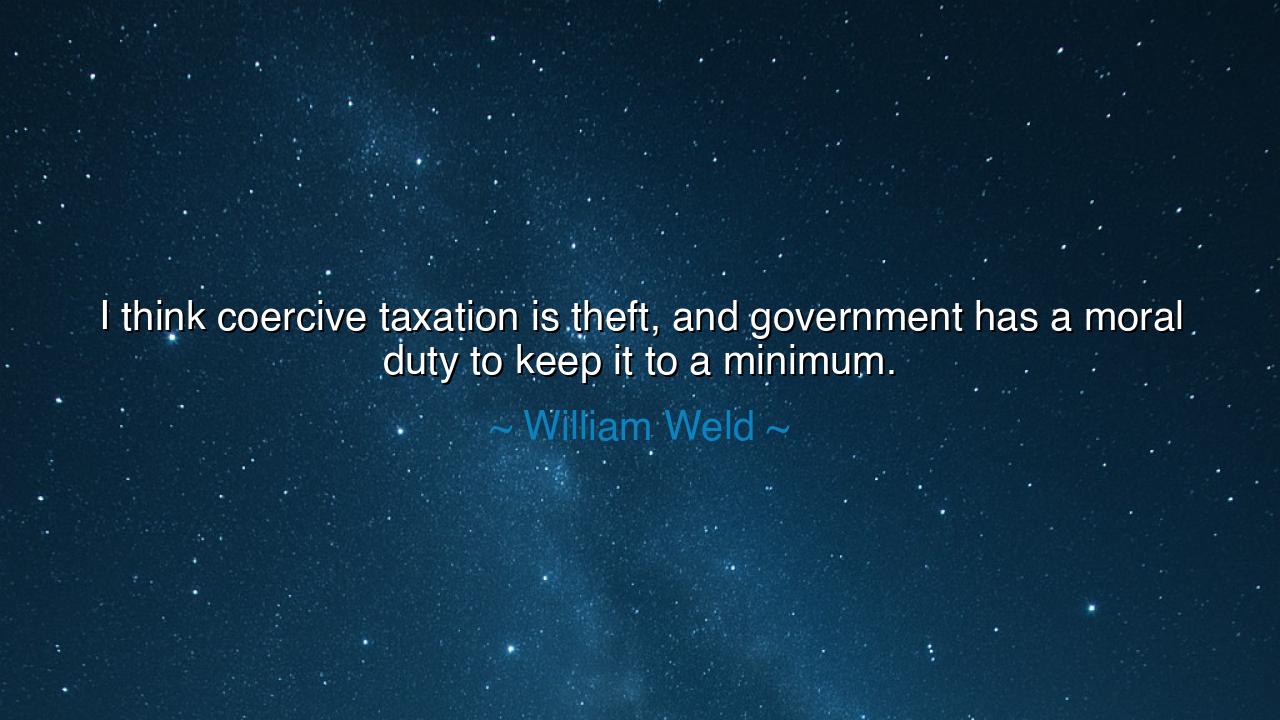
I think coercive taxation is theft, and government has a moral
I think coercive taxation is theft, and government has a moral duty to keep it to a minimum.






In an age where the weight of the state presses ever heavier upon the shoulders of its people, the American statesman William Weld spoke words that burn like a brand upon the conscience of power:
"I think coercive taxation is theft, and government has a moral duty to keep it to a minimum."
These are not the words of a miser guarding his gold, but of a guardian reminding his nation that freedom and obligation must walk hand in hand. For in every age, the line between just governance and tyranny is drawn in coin — in what is taken, and why. To tax is not evil, but to tax without restraint, without humility, and without regard for the labor that gives rise to wealth — that is the beginning of injustice. Weld’s declaration is a call to moral balance: that the state must not consume the strength of its citizens, for the people are not its servants, but its source.
The origin of his thought lies deep within the roots of the American experiment, and indeed within the philosophy of liberty itself. Long before Weld’s time, men like Thomas Jefferson and John Locke had taught that the fruits of a man’s labor belong first to himself. To take from him more than is needed for the preservation of order and justice is to violate a sacred trust. The government, born from the consent of the governed, must tread carefully upon the soil of individual freedom, lest it become the very tyrant it was created to resist. Thus, when Weld calls coercive taxation theft, he speaks in the voice of centuries — of every farmer who toiled only to see his harvest seized, of every craftsman who worked not for his own good, but for the appetite of kings.
Consider the tale of the American Revolution, that fiery dawn of liberty. It began not with cannon or conquest, but with a tax — a tax imposed by a distant empire that had forgotten the dignity of its colonists. “No taxation without representation,” they cried, not because they hated duty, but because they loved justice. The tea thrown into Boston Harbor was not mere protest; it was the symbol of a greater truth: that to compel payment without consent is to rob not just the purse, but the soul. From that act of defiance was born a nation that vowed to govern by the will of its people, not by the greed of rulers.
Yet, as the centuries passed, the republic grew large and comfortable. The state, once small and humble, learned to demand more. Taxes rose like tides; bureaucracies multiplied like vines upon a once-proud oak. The people forgot that every dollar taken by force is a fragment of freedom surrendered. Weld’s voice rose in this new age not as rebellion, but as remembrance. He called for a government that serves rather than devours, that takes only what is necessary to secure the peace, not what is convenient to secure its power.
But hear this truth, O listener: Weld’s words are not a denial of society’s duty to one another. He does not preach greed, but accountability. For taxation, when just, is the means by which a people build the roads of their common destiny — the schools, the justice, the defense of all. What he condemns is coercion, the taking of more than the governed have willingly granted, the use of power to plunder rather than to protect. The moral duty of government, as he declares, is not to grow rich upon the toil of its citizens, but to guard their prosperity like sacred fire.
History offers many warnings to those who forget this balance. In ancient Rome, the tax collectors of the empire — the publicani — grew fat upon the sweat of farmers and soldiers alike. The republic that had once exalted liberty decayed beneath the weight of its own greed. The people, weary of burdens they could no longer bear, traded freedom for bread and circuses, and thus the empire fell. The lesson endures: when a government feeds itself before it feeds its people, it sows the seeds of its own ruin.
So let this teaching stand, clear and eternal: wealth created by honest labor is sacred, and the power to tax it is a trust, not a right. The rulers of any land must remember that every coin taken is a fragment of time stolen, every excessive levy a wound upon the heart of freedom. To govern well is not to demand more, but to waste less. Let the state live as its citizens live — with moderation, discipline, and humility.
Thus ends the teaching: taxation must serve justice, not gluttony. The wise ruler asks not, “How much can I take?” but “How little must I need?” For when government learns restraint, and citizens guard their liberty with vigilance, the flame of freedom burns bright and undying.






AAdministratorAdministrator
Welcome, honored guests. Please leave a comment, we will respond soon